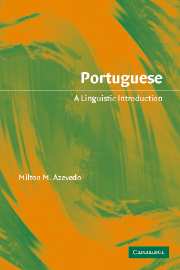Book contents
- Frontmatter
- Contents
- List of maps
- List of tables and figure
- Acknowledgments
- List of abbreviations and symbols
- Introduction
- 1 The Portuguese language in the world
- 2 Sounds
- 3 Words
- 4 Sentences
- 5 Portuguese in time
- 6 The expansion of European Portuguese
- 7 Brazilian Portuguese
- 8 Sociolinguistic issues
- Suggestions for further reading
- Glossary
- Bibliography
- Index
6 - The expansion of European Portuguese
Published online by Cambridge University Press: 05 September 2012
- Frontmatter
- Contents
- List of maps
- List of tables and figure
- Acknowledgments
- List of abbreviations and symbols
- Introduction
- 1 The Portuguese language in the world
- 2 Sounds
- 3 Words
- 4 Sentences
- 5 Portuguese in time
- 6 The expansion of European Portuguese
- 7 Brazilian Portuguese
- 8 Sociolinguistic issues
- Suggestions for further reading
- Glossary
- Bibliography
- Index
Summary
The expansion of Portuguese in the world illustrates what can happen when a segment of a speech community moves out of its original territory to settle down thousands of miles away. There is an approximate parallel with the spread of Latin in the territories conquered by the Roman Empire, or, more recently, with the spread of English in the British Empire. In each situation the language has changed, sometimes drastically, borrowing words from other languages, developing some of its latent possibilities, and eventually acquiring a new countenance, close enough to the original model and yet unmistakably unique.
From the middle of the fifteenth century to the middle of the twentieth, thousands of Portuguese emigrated to other European countries, to Africa, to Asia, to the Americas and, more recently, to Australia. Throughout most of that period, once anchors had been cast off, oral communication was limited to one's immediate community on board or in the new settlements. As this happened, the language, unbeknownst to its speakers, started on a course of its own. In this chapter we will examine some of the ways in which the spread of Portuguese in continental Portugal and elsewhere in the world has fostered innovation.
Aspects of language variation
Reified expressions like “Portuguese language” or “Portuguese” convey an impression of uniformity which, while convenient for the theoretical analysis of language structure, camouflages the fact that any real language is riddled with variation.
- Type
- Chapter
- Information
- PortugueseA Linguistic Introduction, pp. 182 - 210Publisher: Cambridge University PressPrint publication year: 2005



